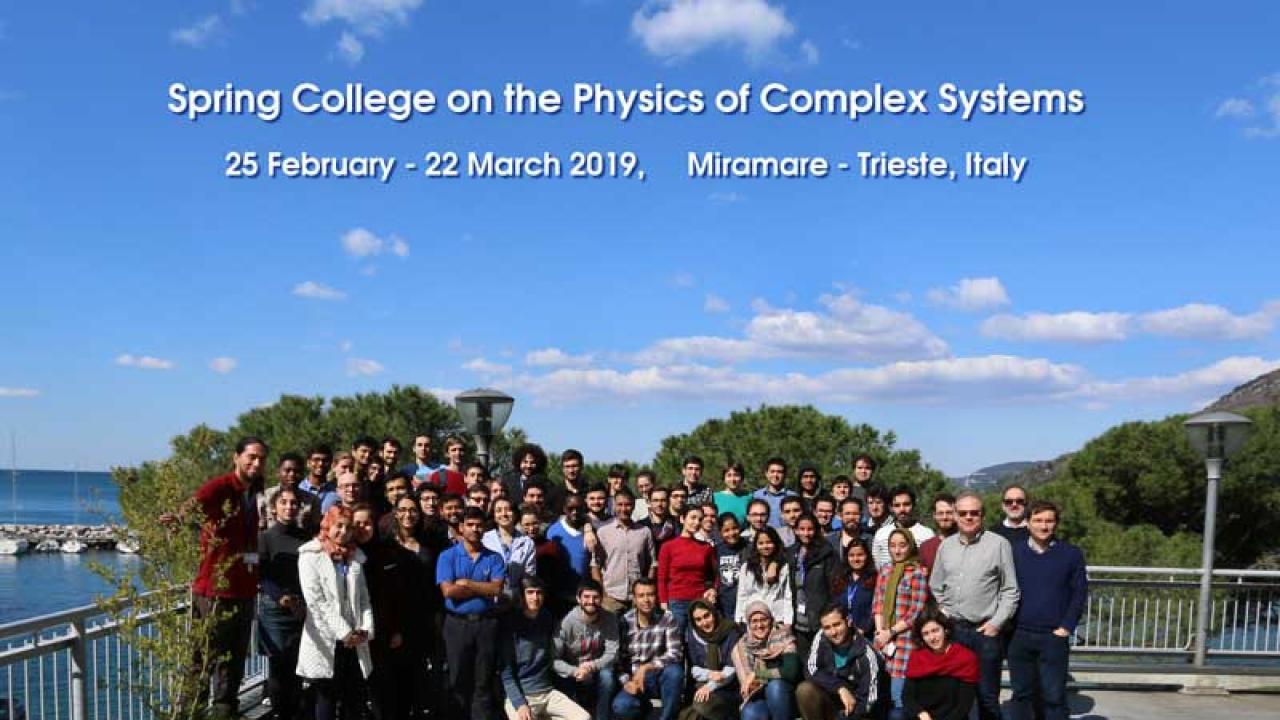
The physics of complex systems may sound like a vague field of study, but complex systems pop up in numerous fields, including materials science, nanoscience, system biology, neuroscience, and financial markets modeling. The recent Spring College on the Physics of Complex Systems at ICTP sought to provide scientists of all stripes the theoretical and technical tools to tackle a complex system in whatever field they wanted. The intense College wrapped up after a month of studies.
The College, which is co-organized yearly at ICTP, is part of a masters programme in the Physics of Complex Systems run jointly by ICTP and several Italian and French universities and research centres. The degree programme aims to offer training in techniques needed to investigate interdisciplinary problems.
With sixty students and five short, concentrated courses of nine lectures each, College organizers relied on the help of four teaching assistants to be a bridge between the professors and students. “We were there to help students not get overwhelmed,” says Solomon Mugisha, a teaching assistant who has recently finished his PhD and is now teaching at the University of Burundi in Bujumbura. “We stayed ahead in the class material to be able to answer questions for the students. We are all a little further in our careers than most of the students, and more fluent in these ideas.”
Sometimes those classes were right in line with what the teaching assistants are studying themselves, and sometimes the material was also fairly new to them. “I was helping with two courses,” says Gabriel Apolinario, who is finishing his PhD at the Federal University of Rio de Janeiro in Brazil. “The first one was in statistical mechanics, similar to what I’m doing my PhD in. But the second was on finance, which I’ve never studied before. It took a quantitative approach, basically looking at how economic laws are more complicated than was previously thought. But finance also includes complex systems.”
From finance to criticality curves, complex systems share some features regardless of what field they appear in. “The course I was helping with, on self-organized criticality, covered many very simple models and tools that make it simple to do many things,” says Daniel Alejandro Martin, who is in his first postdoctoral position at the Universidad Nacional de Mar del Plata in Argentina.
Many of the students at the College were in the last stage of the Physics of Complex Systems master programme, while others came as well-qualified students enrolled in other degree programmes. “The field of complex systems is vast and in progress,” said teaching assistant Nahid Ghodratipour, a PhD student in mathematical physics at the Sharif University of Technology in Tehran, Iran. “Many people interested in various aspects of probabilistic and many-body systems are interested in working in this area of research.”
The content and the techniques taught at the course were only one facet of the Spring College. “It was interesting to me to see how masters programmes work in Europe,” says Martin. “I learned several teaching strategies. It was a very good opportunity to compare different teaching and research systems.” Mugisha also noted the teaching methods of the various professors. “It was good to see different teaching styles, and to learn from international scientists who clearly know what they are talking about,” he said.
“It was also good to meet researchers from all over the world,” chimed in Apolinario. “It’s great to meet people doing great research, people that you don’t often hear about.” There were twenty countries represented among the students alone, and with professors and other ICTP visitors, the networking opportunities were plentiful.
The social experience, all agreed, was a key positive part of the College. “It was really great to meet people from so many places,” said Mugisha. “I did sometimes have to tell people where Burundi is, sometimes Africa is thought of as one country. But the international element of the College is great.” More social events could be added to the programme, the teaching assistants agreed, to have some contrast to studying.
“It was my first time at ICTP, and it’s a lovely place,” said Ghodratipour, adding, “The atmosphere of the school was energetic and joyful. I hope to have scientific collaborations here in the future.” The College sought to thoroughly prepare students for an expansive field, as well as give an intense experience. “There was so much information to study, there was a constant feeling of not having enough time,” said Apolinario. Overall, Mugisha said, “the College was intensive, hard, but enjoyable and worth it.”
----- Kelsey Calhoun
















